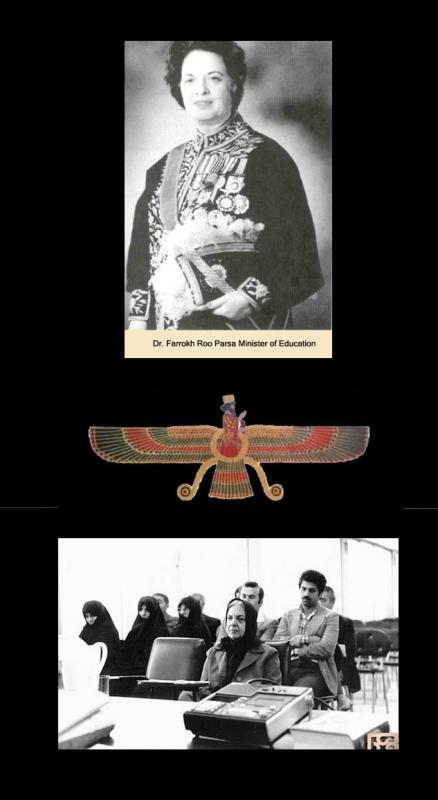
Farokhroo Pārsā was the minister of education in the second and third cabinet of Amir-Abbas Hoveida. She became a minister in 1968. Pārsā was an outspoken supporter of women’s rights in Iran, After the Revolution in Iran, she was tried and found guilty [by a “revolutionary court”] of financial corruption and spreading moral corruption through prostitution in the ministry while it was under her guidance. She was finally executed by a Fire Squad, apparently after weeks of physical torture ( including being put in a plastic bag and kicked by her male wardens) on May 8, 1980.
Accomplishments:
During her term as the Secretary of Education:
- She appointed a lot of qualified women to positions that were primarily dominated by men. This encouraged women to work more enthusiastically, knowing that higher courier achievments are now possible.
- Hundreds of new schools were opened across the country. The largest and most important of them all was a complex called ” Farah Educational Complex” ,further south of Tehran, which maintained over 5000 students, boys and girls mixed together, from kindergarten through highschool. The principal of this school, Nadjmi Vosooghi, also a capable woman, who handled this position through out the years until the revolution.
- The education became public through out the country, first from kindergarten through 8th grade and a year later through highschool.
- Free breakfast and lunch started being served to all students. She was faced with the biggest challenge in her political life because of distribution channels, or the lack of it, but she did overcome the challenge to her best ability and the country’s.
In her last letter from prison, Farrokhroo Pārsā wrote to her children:
“I am a doctor, so I have no fear of death. Death is only a moment and no more. I am prepared to receive death with open arms rather than live in shame by being forced to be veiled. I am not going to bow to those who expect me to express regret for fifty years of my efforts for equality between men and women. I am not prepared to wear the chador and step back in history.”
More Complete Bio here
Edith Piaf – Non, je ne regrette rien (1961):
Recommeded Readings:
A Women for All Seasons: In Memory of Farokhroo Pārsā by Ardavan Bahrami
BOOK: EVEN AFTER ALL THIS TIME By Afschineh Latifi ( A Memoir )
The Generals Widow By Cyrus KADIVAR
Dialogue of murder:A cautionary tale that must not be forgotten By Cyrus KADIVAR
Related Blogs:






